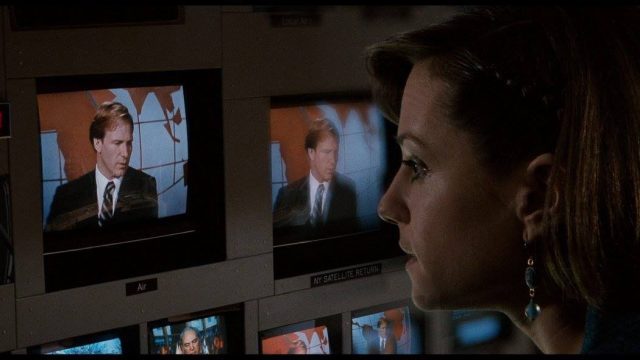“I think I should be alone for a while.”
“I understand. I think I’ll go with you.”
“Thanks.”
There are quite a few films about journalism, especially ones set in the US. Usually, these films have a point, something they’re headed towards, like toppling a governing power or exposing an unseemly truth. I guess the unseemly truth in this one is that people, even the good ones, aren’t perfect. A very telling scene is when Jane (Holly Hunter) helps Aaron (Albert Brooks) prepare to anchor the weekend news as a last-ditch effort at pleasing the higher-ups at the news corporation. Aaron isn’t quite the anchor type, and his shoulders show it, so Jane pulls the shoulder pads out of her jacket and gives them to Aaron. Her goal is clear, to help a friend. But once she has a moment alone, she pulls at her shoulders, where the pads once were, unsatisfied.
It seems that the film is less about journalism and more about dissatisfaction. Primarily with love, but it also touches on dissatisfaction with intelligence (Tom), exposure (Aaron), and the current and likely future state of things (Jane). But they’re all dissatisfied with love. The dissatisfaction shows most in the glances, not the words, of which writer/director James L. Brooks is a fan. Brooks is the wordiest writer, bridging the gap between Sturges and Sorkin, but damn does he do his damnedest to get those glances in the most perfectly sad and longing way, right in the middle of a fight.
There’s not much to distinguish the film visually, though there are some fun split diopter shots. Its biggest strength is its sense of humor: zany, naturalistic, wry, mean at times, and worst of all: indicative. In a scene showing Tom’s coverage of rape, Aaron, who has been presented as the smarter of the two men, makes jokes about a crying woman recounting the night she was assaulted. It’s indicative of Aaron’s cynicism and misogyny. The cold open of the film indicates Tom’s drive despite his lack of intelligence. And Jane anchors the whole film, bursting into tears every morning.
This movie reports on the reporters in a way fiction rarely does. It’s mean, it’s funny, it’s romantic, and it’s realistic. It’s almost truthful. Near the end of the film, Jane and Tom embrace and kiss. In most rom-coms, there’s a crowd to applaud, but with Jane and Tom, it’s secret and by the end of the film, it isn’t. For a rom-com, or a film often perceived as one, there’s no normal happy ending. And I love that.

